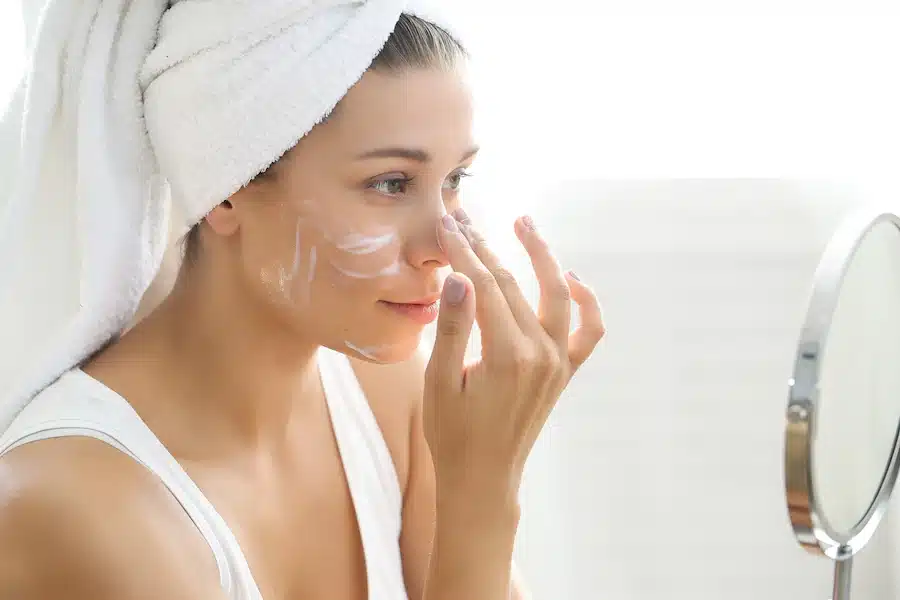So that you can protect your skin against solar radiation, we have prepared a list of 15 interesting facts about sunscreen.
To protect your skin from sun damage, Sunscreen is essential. However, despite being widely known and used, it holds interesting curiosities that many are unaware of. After all, behind this apparently simple product, there are fascinating facts that invite us to explore a little more about its history and benefits.
Firstly, when choosing a sunscreen, check the SPF indicated on the packaging. It is important that it protects against both types of radiation (UVA and UVB). Furthermore, Knowing your skin type is essential to choose the appropriate sunscreen. People with fair skin and freckles are more at risk when exposed without protection.
Let’s discover some of these surprising facts involving sunscreen and its essential role in our daily skin care routine.
Fun facts about sunscreen
1. What is SPF?
FPS stands for sun protection factor and is determined based on the ratio between the amounts of UV radiation necessary for sunburn to occur. For example, if unprotected skin burns after 10 minutes of sun exposure, when applying sunscreen with SPF 10 to the skin, it will suffer sunburn after 100 minutes of exposure.
Likewise, by applying a sunscreen with SPF 30, the skin will suffer from sunburn after 300 minutes of exposure. Anyway, to know how long it will take to get a sunburn, just multiply the minutes by the PFS.
2. What is the correct way to use sunscreen?
In short, It is important to apply sunscreen whenever you are exposed to solar radiation. And not just when you’re at the beach or pool. For example, when practicing physical activities outdoors or a professional activity on the street.
Furthermore, to achieve adequate protection against sunburn, it is necessary to apply an amount of 2 mg/cm² of sunscreen. Anyway, the product starts to take effect as soon as it is applied. However, it may take up to 10 minutes to settle into the skin.
Therefore, ideally it should be applied approximately 15 to 10 minutes before exposing yourself to the sun. Furthermore, it is necessary to reapply the product every 2 hours during exposure and whenever diving in the pool, the sea or excessive sweating. The maximum time the product stays on the skin is 2 hours.
3. Is tanning healthy?
Contrary to what many believe, tanning is unhealthy. In truth, This is a skin defense mechanism against aggression caused by exposure to ultraviolet radiation.
In other words, the body increases the production of melaninto create a kind of protective cover to protect the skin against sunburn. It is worth remembering that even black skin, without the use of sunscreen, is also susceptible to damage caused by solar radiation.
Finally, you don’t need to be exposed to the sun for hours for the synthesis of vitamin D to take place. Just 10 minutes a day and three times a week.
4. Are all sunscreens the same?
The answer is no. Then, Each sunscreen differs from one another due to several factors. For example, the stability of its filters, the protection factor for different ultraviolet radiation, adherence to the skin, the type of texture, etc.
Furthermore, regarding the protection factor, no sunscreen can block 100% of solar radiation. However, the higher the protection factor, the better. On the other hand, applying more than one type of protector at the same time will not increase its effectiveness.
5. Do I need to reapply waterproof sunscreen?
Currently, available sunscreens can withstand at least a swim (sea or pool) of up to 20 minutes. However, some products may stay on the skin longer.
But none are completely water resistant. That way, You need to reapply sunscreen after bathing. Therefore, before using it, check the information indicated on the packaging, which may be as follows:
- Waterproof: effectively after a 40-minute shower.
- Waterproof: effectively after an 80-minute shower.
Finally, it is important to know that ultraviolet rays penetrate water up to 50 cm, which can cause sunburn on the face, shoulders and back.
6. Does sunscreen prevent your skin from tanning?
Mito. Because, even using sunscreen, an amount of solar radiation penetrates the skin. Therefore, the body’s natural protection system is activated, causing melanin production to increase. Resulting in tanned skin.
7. Does SPF protect against UVB and UVA radiation?
As we have already mentioned, the sun protection factor refers to protection against UVB radiation, which causes burns. However, does not protect against UVA radiationwhich are responsible for increasing the risk of skin cancer and skin aging.
Therefore, In addition to SPF, sunscreen also needs to have anti-UVA protection in its composition..
8. Which sunscreen is ideal for babies and children?
When choosing the ideal sunscreen for babies or childrenchoose hypoallergenic ones. However, babies should not be exposed directly to solar radiation. Therefore, in addition to sunscreen, wear clothes and hats to protect them. Additionally, follow appropriate sun exposure times.
9. Is it necessary to apply sunscreen to the face on sunny days?
The answer is yes. Then, Even on cloudy or rainy days, ultraviolet rays are emitted that reach the skin and cause damage.
Furthermore, you need to apply sunscreen even if you are staying indoors. Because fluorescent lights emit visible light, which can help worsen diseases that cause blemishes or darkening of the skin.
10. The greatest protective power of sunscreens is SPF 30?
No! Although SPF 30 is considered an adequate level of protection for daily use, There are sunscreens with higher SPF, such as 50, 70 or even 100.
Thus, sunscreens with a higher SPF offer greater protection against sunburn, but it is important to highlight that they do not provide proportionally greater protection against UVB rays.
11- Is there a difference in effectiveness between spray and cream sunscreen?
There are no differences in the effectiveness of spray or cream sunscreen. Therefore, the choice of protector must be based on the characteristics of the skin, which has a PFS greater than 30 and protection against UVA rays or broad-spectrum protection.
12. Can you apply sunscreen on damp skin?
Among the interesting facts about sunscreen is how effective it is when applied to damp skin. Anyway, Ideally, it should be applied to dry skin, as water can dilute the product, reducing its protection value..
13. Are caps and hats with a protection factor effective?
Yes, as long as they are used properly. In other words, the model, size of the flap and the material they are made of will determine the degree of protection.
14. Are oils with a protection factor safe?
The answer is no. Because they are easy to apply and end up leaving a thin, transparent layer on the skin, reducing its effectiveness and sun protection factor.
15. When is the best time to sunbathe?
Anyway, concluding our list with curiosities about sunscreen, The best time for sun exposure is until 10 am and after 4 pm. Therefore, outside this period, even in the shade, it is essential to apply the product. Mainly on the beach as there is irradiation through the sand.
Fun facts about sunscreen: care
We conclude our list of curiosities about sunscreen. However, it is important to take other precautions in addition to applying the product. For example:
- After aesthetic treatments or surgeries, you should consult your doctor regarding the appropriate amount of time for sun exposure.
- Wear sunglasses and a hat when going to the beach, pool or countryside. This way, you protect your eyes and face from sun exposure.
- And to protect your hair, apply sunscreen to protect against damage from the sun, sea water or chlorine.
- Finally, stay hydrated at all times. Drink plenty of fluids and after bathing, apply an after-sun moisturizer to your face and body.
Ultimately, as Pedro Bial would say, always use sunscreen. This way, you prevent premature aging of your skin, in addition to reducing the risk of developing skin cancer. But, don’t forget to check the product’s expiration date before using it.
Sources: Momentum, Caufarma, Media




